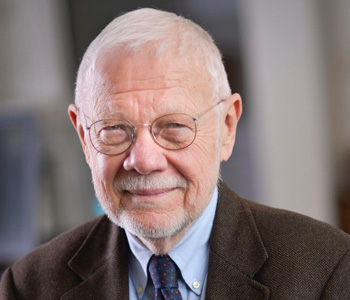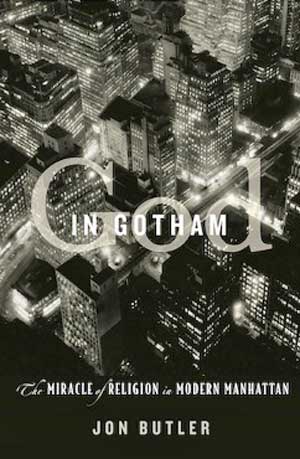
Max Weber, the German sociologist, and his wife Marianne weren’t impressed with Manhattan’s spirituality when they visited New York City during their 1904 trip to the United States. They probed for religion throughout their American visit but found only disappointment in Manhattan. “The tremendous increase in the clubs and orders here substitutes for the declining organization of the church,” Weber observed. The sermons they heard were boring. St. Paul’s Chapel, built in the 1760s, a “little church” with a “gothic tower that tries to assert itself like an island of peace amid the untamed din of the streets,” symbolized to him faith’s fate in the urban cauldron. Fifteen years later Weber famously proclaimed the “disenchantment of the world.” Wonders, spirits, and the miraculous were evaporating, giving way to bureaucracy, science, technology, and the loss of face-to-face community, when rural villagers flocked to cities. Modernity was killing religion as Western civilization had known it for centuries.
In contrast, Judy Blume’s 1970 teen fiction bestseller, Are You There God? It’s Me, Margaret, described American suburbs full of religion, an extension of young married couples’ urban religious upbringing. Far from confronting modern “disenchantment,” Margaret Simons, Blume’s sixth grade, Manhattan-born, newly suburbanized protagonist found herself surrounded by synagogues and churches. Which was right for her?
Margaret’s infamous talk about boys, her first bra, and her eagerly anticipated first period won Blume immediate attention from school censors. Yet Blume’s title caught Margaret’s main worry: religion. Margaret had none. Facing their parents’ objection to a mixed marriage, Margaret’s Jewish father and Protestant mother punted on faith. But all her suburban classmates “belonged,” and Margaret persistently sought out religion in suburban congregations and nightly “talks with God,” her prayers raising transcendent questions about loneliness, shame, and responsibility.
Judy Blume versus Max Weber? God in Gotham: The Miracle of Religion in Modern Manhattan bets that Blume was right, not Weber. Far from exemplifying Weber’s famous “disenchantment,” modern Manhattan birthed an urban spiritual landscape of unparalleled breadth that post-WWII Manhattan exiles sought to reproduce in the suburbs. In the Manhattan of their childhood, modernity refreshed religion.
Between the 1880s and the 1940s Gothamites stuffed the city with the sacred, just when Weber thought it would be dying. Catholics, Jews, and Protestants peppered the borough with sanctuaries black and white, great and small. Manhattan became a center of religious publishing and broadcasting. It nourished a host of spiritual reformers from Reinhold Niebuhr to Abraham Heschel, Adam Clayton Powell Sr. and Jr., Dorothy Day, and Norman Vincent Peale. Nontraditional white groups met in midtown hotels while nontraditional black worshipers gathered in Harlem’s storefront churches. Though denied the ministry in all the major denominations, women shaped the lived religion of congregations everywhere, founded missionary and literary societies, and fused spirituality and political activism in organizations such as the Zionist Hadassah.
After 1945, when young Manhattan families rushed to the New Jersey and Long Island suburbs, they recreated the Jewish, Catholic, and Protestant religious worlds to which Judy Blume’s young Margaret Simons so wished she could belong—none of this possible without religion’s success in early twentieth-century Manhattan, contrary to Weber’s famous prognostication.
God in Gotham is meant to trace the unexpected and widely unnoticed resilience of traditional organized religion in early twentieth-century Manhattan—Protestantism, Catholicism, and Judaism—when Weber worried about “disenchantment” and religious leaders fretted about each other and the press of urban density, rampant pluralism, and spirit-crushing anonymity that seemed ill-fitted for traditional face-to-face rural religiosity.
The book emerged from three sources: teaching, a friendship, and a late adolescent fascination.
Teaching: thirty years of managing lectures and seminars for undergraduate and graduate students consistently exposed a conundrum: if modern urbanism suffocated religion, as Weber and secularization theorists said it would and did, how could religion so powerfully pop up like a jack-in-the-box after 1950? Martin Luther King, Jr. marshaled faith as a central force in the civil rights crusade. Jerry Falwell and his successors built a conservative cultural movement on Protestant evangelicalism. Judy Blume entitled her rampant best seller, Are You There God? It’s Me, Margaret, without a hint of anachronism.
A friendship: I was trained to study Britain’s seventeenth- and eighteenth-century American colonies but spent almost three decades discussing twentieth-century city life, religion, and secularization with Eric Monkkonen, UCLA’s distinguished urban historian. We had been history graduate students at the University of Minnesota, were married to former college roommates, and talked history, especially urban history, every summer for multiple decades of Minneapolis summers as we shepherded our two boys (each) to wading pools and basketball camps. Sadly, Eric died in 2005. I so wish he could have read the book that the conversations produced and tell me what he thought of it.
A fascination: what Midwestern farm town boy or girl isn’t lured by cities, reinforced by a senior class trip (1958) that included three glorious days in Manhattan, with West Side Story playing near our hotel and Tad’s Steak House, the seeming paragon of culinary sophistication, a block away? I was. Happily, the lure of Manhattan never abated.
God in Gotham thus became the perfect project. Where better than Manhattan, the seeming epitome of modern American secularism, to solve a conundrum about American cultural and religious history, lean on the deepest of friendships, and satisfy a long-delayed pre-college fascination?
Browsing readers might try Chapter 5, “God’s Urban Hothouse.” Anyone doubtful about religiosity in early and mid-twentieth-century Manhattan might profitably turn to this chapter, which describes Manhattan as a modern urban spiritual wonderland.
Between the 1920s and the 1960s, Manhattan stimulated an outpouring of individual and institutional religious creativity unsurpassed in any other American locale, urban or rural, and in any century.
Mordecai Kaplan, Abraham Heschel, and Joseph Soloveitchik recast understandings of American Judaism. Dorothy Day, Adam Clayton Powell, Sr., and his son, the congressman Adam Clayton Powell, Jr., asserted religion’s required and necessary role in challenging inhumanity and bigotry. Reinhold Niebuhr, Paul Tillich, Jacques Maritain, and Norman Vincent Peale transformed theological and cultural conceptions of religion in ways that have had enormous, lasting effects. They transformed modern theology and religious thinking amidst the din of urban life that Weber thought so spiritually hostile.
Manhattan’s vibrancy lured formidable faculties to Union Theological Seminary, Jewish Theological Seminary, and Yeshiva’s Rabbi Isaac Elchanan Theological Seminary, all of them modern, well-financed, bureaucratically organized institutions. If anything, Manhattan publishers actually increased their output of religious books, which Manhattan’s Publishers Weekly publicized to booksellers and public libraries across the nation. Manhattan-born pastoral counseling combined psychology with religious advising, much of it led by the otherwise often criticized Norman Vincent Peale. The remarkably spiritual Alcoholics Anonymous emerged in Manhattan in the late 1930s. Its famous Big Book described how drunks might assemble a “moral inventory,” then turn their “lives over to the care of God as we understand him,” the italicized words revealing how AA adopted an amorphously powerful spirituality that eschewed narrow religious doctrines.
No single “Manhattan theology” emerged from these thinkers and practitioners. Most leaned liberal but in strikingly different, often contradictory, ways. Most addressed their inherited traditions, but all of them found audiences outside these boundaries. Most also were immigrants, like so many other Gothamites. Only Tillich and Maritain arrived with substantial European reputations. Niebuhr, Heschel, Soloveitchik, Day, and Peale all saw the impact of their work amplified by the opportunities Manhattan provided.
Together they fostered passionate new religious visions that changed what God and religious life meant to millions of Americans, plus others across the world, and did so in decades and an urban place that have long seemed inhospitable to things spiritual.
God in Gotham wasn’t written to celebrate religion. But it was written to help readers understand what might have been accomplished by religious people in seemingly strained settings. In this regard, it is implicitly and explicitly critical of two strands in writing about religion in twenty-first-century America.
First, God in Gotham is critical of histories that implicitly and explicitly celebrate the religious commitment of previous rather than recent times. Historians and scholars of religion have spent too much time insisting that before 1500 religion in the West was essentially “axiomatic,” or a given. But after 1500 (yes, it’s not an accident that the Protestant Reformation dates from 1517) it is said that Westerners faced choices that ultimately led to secularization and its steady effacement of religion. Such accounts dismiss the complexity of the past. Religious commitment and adherence were problematic in all ages and all settings, if hardly in the same ways. It was not without reason that before 1500 every European nation attached horrific penalties to those who rejected religion broadly or spurned its specific government- or church-sanctioned forms, including maiming and death.
Second, God in Gotham is critical of histories that treat twentieth-century American life as all but bereft of religion, especially from the 1920s into the 1970s. They often bypass the deep religious dimensions of the post-1945 civil rights crusade, despite the religious affiliations of so many civil rights leaders. Then such histories breathlessly scramble to describe the rise of conservative evangelical politics, deftly avoiding any account of how the movement could have emerged from the seemingly silent religious stage of the previous half-century.
God in Gotham is hardly without criticism of the figures and movements it describes and discusses. Nor does it suggest that success in grappling with urban modernity after 1880 precluded new difficulties such as those that have emerged powerfully since the 1980s—from the sexual abuse scandals in Catholicism and Protestantism to the stark decline in the mainstream denominations and the rise of the religious “nones”, especially among the young, who are indifferent to traditional organized religion. For better or worse, God in Gotham is a distinctly historical book about the fate of organized religion in a specific place during specific decades. It is not a breezy prognostication about religion’s future in twenty-first century America or the world. However potentially interesting, that is a task blessedly beyond the skills of a historian, and certainly beyond the skills of this one.


Jon Butler is a retired Yale historian of American religion. He grew up in a Minnesota farm town (Hector, in Renville County) 100 miles west of Minneapolis and received both his BA and PhD from the University of Minnesota. He taught at California State University, Bakersfield, the University of Illinois at Chicago, and Yale, where he also chaired the American Studies Program and History Department and served as Dean of the Graduate School. His books include Awash in a Sea of Faith: Christianizing the American People and Becoming America: The Revolution before 1776. He lives in Minneapolis.